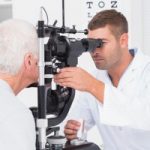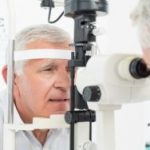
Every year you probably go in to see your doctor for your annual physical. They may check your heart and blood pressure, and check for any lumps. It gives you a chance to discuss any health concerns you may have. An annual physical is important because it can catch illnesses early enough to prevent them from worsening. Just like your whole body needs a medical exam, your eyes require one too; unfortunately, many of us don’t visit the optometrist regularly, which can put our vision at risk.
Don’t skip out on your eye exam
Advertisement
 Depending on your age and other medical conditions, you may need to visit your eye doctor twice a year or at least every two years. As we age our eyes become susceptible to many changes that impair our vision. Some of these changes are natural and can be easily fixed through corrective lenses. Other eye conditions are more serious and can be the result of complications from another condition, such as diabetic retinopathy, a complication of uncontrolled diabetes.
Depending on your age and other medical conditions, you may need to visit your eye doctor twice a year or at least every two years. As we age our eyes become susceptible to many changes that impair our vision. Some of these changes are natural and can be easily fixed through corrective lenses. Other eye conditions are more serious and can be the result of complications from another condition, such as diabetic retinopathy, a complication of uncontrolled diabetes.
Optometrists have the ability to see all of your eye, not just the surface. For that reason they are able to catch symptoms early on and suggest changes you can make to help improve and maintain your vision health. For example, diabetes, high blood pressure and even some cancers can be diagnosed during an eye exam, so even if you’re going for your annual physical, your doctor may not be able to get a full range of symptoms if they can’t look deep into your eyes.
How is an eye exam conducted?
 There are a few different things that occur during a typical eye exam. Below is what you can expect when you go to get your eyes checked.
There are a few different things that occur during a typical eye exam. Below is what you can expect when you go to get your eyes checked.
- Your eye doctor will discuss your history with you – did your parents have any vision problems? Have your eyes ever experienced trauma?
- The doctor will test your eyes by making you read images close and far away, as well as checking your peripheral vision.
- Your doctor may perform a pressure test, known as tonometry, which tests for glaucoma.
- Your doctor will put drops in your eyes to dilate them in order to see fully into the back of your eyes.
- Your doctor may prescribe corrective lenses if your vision is weak, and they can be customized to each eye’s needs.
If your eye doctor finds any problems, they may suggest that you visit them more often to monitor your vision. Furthermore, they may suggest medications, eye drops or even lifestyle changes that can work to improve your vision.
Conditions such as a family history of vision problems, cataracts, glaucoma, diabetes, hypertension, macular degeneration and corneal diseases will warrant frequent doctor visits.
In order to improve your overall health, all aspects of health should be explored – eyes included. If you haven’t checked in with your eye doctor in a while, we strongly suggest that you book an appointment. Eye health is necessary to maintain vision over time, so having a doctor regularly check them is important; only a qualified optometrist will be able to uncover what is really going on inside your eyes.
